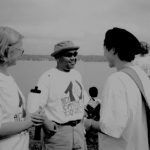Do you see reaching out for help and support as a sign of weakness or of not being able to ‘do it on your own’? We’re taught that the chief goal of aging is to maintain independence.  Would you believe me if I told you that opening yourself up to others actually makes you one of the most courageous, and ultimately among the strongest, people aging with HIV?
Would you believe me if I told you that opening yourself up to others actually makes you one of the most courageous, and ultimately among the strongest, people aging with HIV?
It can be intimidating to make a new friend, rekindle a relationship with an estranged family member, or join a group. Depression and anxiety can make it easier to stay home, to disconnect, or to lose sight of the value of existing relationships.[1] And depression and anxiety are common among people living with HIV.[2] Letting others in, especially if you are concerned about how they will respond to your HIV status, can seem daunting.[3] It takes fortitude, but the short term discomfort you feel about reaching out is likely to pay off in terms of your long-term health and happiness.
Relational living – in other words, feeling connected to family, friends, partners, children, teammates, colleagues and peers – is one of seven factors that contributes to resilience among those aging with HIV.[4] People living with HIV who feel supported report better physical and mental health [5] [6] and may be better able to cope in difficult times. Knowing there is someone in your life who can care for you if you need support can reduce feelings of uncertainty which often accompany aging with HIV.[7] In addition to being enjoyable, a healthy social life can help you maintain cognitive function[8], reduce depression6, improve medication adherence[9], and even decrease your risk of ending up in hospital.[10]
If it’s so great, why isn’t everyone part of a robust social network? Many factors may contribute to social isolation (limited interaction with others) and loneliness (the distress related to feeling under-supported) among older people in general, including: poor health, loss of a partner, mobility issues and living alone.[11] While there is some debate as to whether social support differs among older people based on their HIV status 10 [12], the ability of people aging with HIV to maintain relationships and build new social networks may be complicated by stigma, long-term disengagement from the workforce, and a history of loss and community trauma.[13] Whatever the reasons, in one large study, more than half of older adults living with HIV reported experiencing loneliness and social isolation.[14] So, what can be done?
It is never too late to connect to others by different means, and based on different commonalities. If you want to discuss your experience aging with HIV, consider taking part in a peer group or consider becoming a volunteer peer educator or public speaker. For the tech-savvy, try the Long-Term Survivors’ forums at forums.poz.com, or join the Facebook group HIV Long-Term Survivors. And if you are a really motivated long-term survivor of HIV/AIDS, you could even take the lead by helping to advocate for the needs of your peers. Let’s Kick ASS (AIDS Survivor Syndrome), is a grassroots movement of long-term survivors that is looking to set up new chapters across North America. Generativity, a fancy word for giving back to your community by sharing your lived experience with others, especially younger generations, enhances resilience among older adults living with HIV.4
Or maybe you don’t want to talk about HIV at all. Peer support is only one option. Do you love cooking or going for hikes? Think about registering for Parks and Recreation group programs through your local municipality. Subsidies are often available to support your participation, no matter your financial status. If you prefer a more informal route, reconnect with old friends by phone, introduce yourself to your neighbours, chat someone up at the dog park, or join a small group at your chosen faith-based organization.
If you work in a community-based HIV organization, ask yourself whether your programming provides sufficient opportunities for older adults living with HIV to connect socially. Are your group programs accessible to people who have mobility issues? Is the focus on HIV prevention or new diagnosis to the detriment of supporting people living long-term with HIV? Sometimes belonging is just as important as being in the know.
Connecting with someone you like and trust is good for your health, and theirs. So reach out! It’s bound to feel good.
[1] N ational Institute of Mental Health. Older Adults and Depression. Accessed from https://www.nimh.nih.gov/health/publications/older-adults-and-depression-qf-16-7697/index.shtml
[2] Do AN, Rosenberg ES, Sullivan PS, Beer L, Strine TW, Schulden JD et al. 2014. Excess burden of depression among HIV-infected persons receiving medical care in the United States: Data from the medical monitoring project and the behavioural risk factor surveillance system. PLOSone, 9(3), e92842.
[3] Emlet CA. 2008. Truth and consequences: a qualitative exploration of HIV disclosure in older adults. AIDS Care, 20(6), 710-17.
[4] Emlet CA, Tozay S, Raveis VH. 2011. “I’m not going to die from the AIDS”:resilience in aging with HIV disease. Gerontologist, 51(1), 101-11.
[5] Emlet CA, Fredriksen-Goldsen KI, Kim HJ. 2013. Risk and protective factors associate with health-related quality of life among older gay and bisexual men living with HIV disease. Gerontologist, 53(6), 963-72.
[6] Bekele T, Rourke SB, Tucker R, Greene S, Sobota M, Koornstra J et al. 2013. Direct and indirect effects of perceived social support on health-related quality of life in persons living with HIV/AIDS. AIDS Care, 25(3), 337-46.
[7] Solomon P, O’Brien K, Wilkins S, Gervais N. 2014. Aging with HIV and disability: the role of uncertainty. AIDS Care, 26(2), 240-5.
[8] Vance DE, Fazeli PL, Grant JS, Slater LZ, Raper JL. 2013. The role of neuroplasticity and cognitive reserve in aging with HIV: Recommendations for protection and rehabilitation. J Neurosci Nurs, 45(5), 306-16.
[9] Turan B, Smith W, Cohen MH, Wilson TE, Adimora AA, Merenstein D et al. 2016. Depression and social isolation mediate effect of HIV stigma on Women’s ART adherence. CROI conference poster #919. Accessed from http://www.croiconference.org/sites/default/files/posters-2016/919.pdf
[10] Greysen SR, Horwitz LI, Covinsky KE, Gordon K, Ohl ME, Justice AC. 2013. Does social isolation predict hospitalization and mortality among HIV+ and uninfected older veterans? J Am Geriatr Soc, 61(9), 1456-63.
[11] Menec V. 2016. Loneliness and social isolation are important health risks in the elderly. Accessed from https://www.mcmasteroptimalaging.org/blog/detail/professionals-blog/2016/04/08/loneliness-and-social-isolation-are-important-health-risks-in-the-elderly
[12] Moore RC, Moore DJ, Thompson WK, Vahia IV, Grant I, Jeste DV. 2013. A case-controlled study of successful aging in older HIV-infected adults. J Clin Psychiatry, 74(5), e417-23.
[13] Rosenfeld D, Bartlam B, Smith RD. 2012. Out of the closet and into the trenches: gay male baby boomers, aging and HIV/AIDS. Gerontologist, 52(2), 255-64.
[14] John M, Hessol N, Hare CB, Lyons C, Zepf R, Marcotte T et al. 2014. Veterans aging cohort study (VACS) index, functional status, and other patient reported outcomes in older HIV-positive (HIV+) adults. Poster Abstract Session: HIV: Comorbidities and Cofinfections, IDWeek. Accessed from https://idsa.confex.com/idsa/2014/webprogram/Paper47178.html
By Kate Murzin
Kate is the Health Programs Specialist at realize (formerly the Canadian Working Group on HIV and Rehabilitation)





